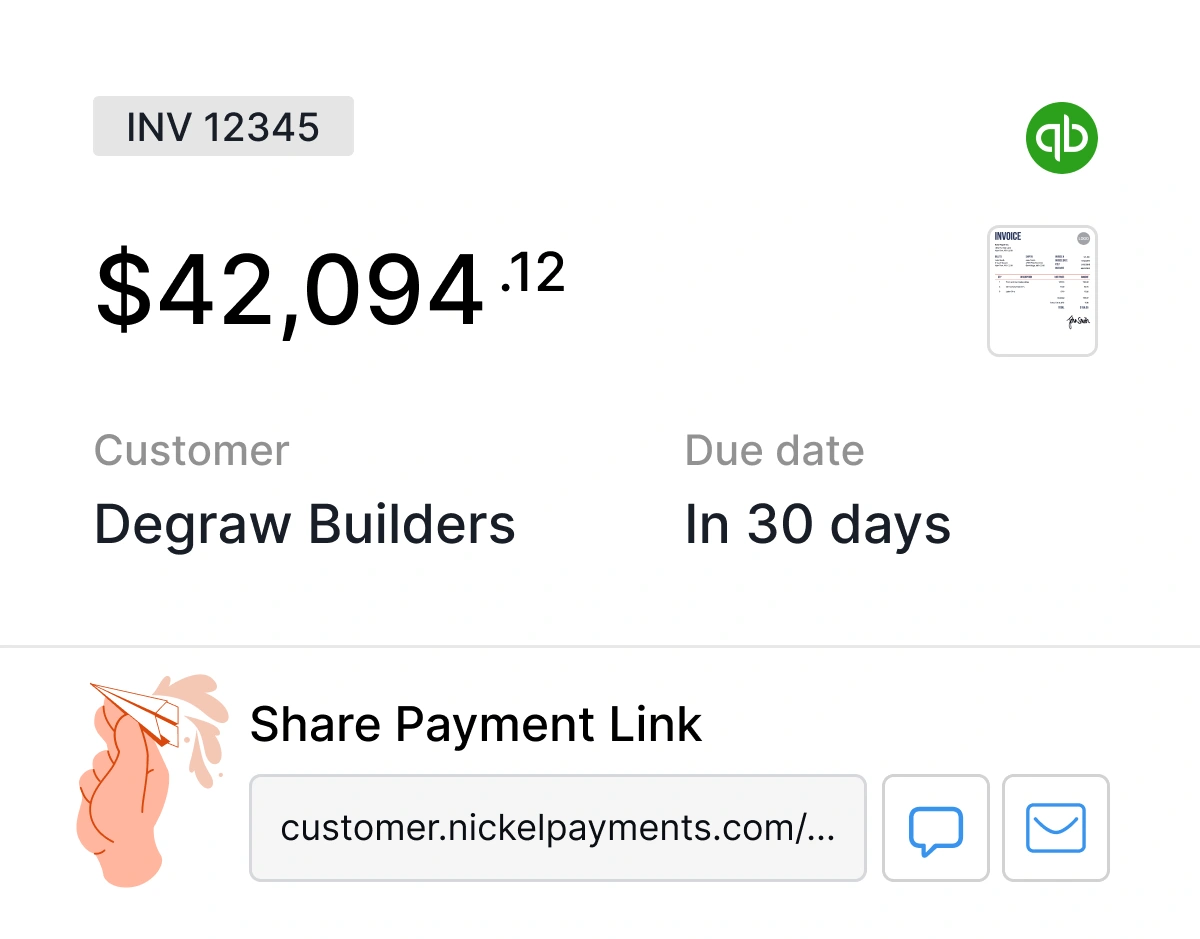The Payment Platform Built for Ironworkers
Power through payment delays with invoicing that actually works for structural steel professionals

Trusted by 10,000+ industrial small businesses














































Why Ironworkers Are Switching to Nickel
Unlike traditional payment processors that treat you like a "high-risk" business, Nickel was built specifically for trade professionals who handle large invoice-based transactions. We understand that:
- $50,000 structural steel beam orders are normal business, not suspicious activity
- Project-based revenue creates payment surges that banks often flag as unusual
- You need reliable processing during peak construction seasons when infrastructure projects accelerate
- Your cash flow depends on predictable payment timing, not arbitrary holds
Result: No surprise account holds, no "business verification" delays, no risk department calls.

Why Ironworkers Are Switching to Nickel
Unlike traditional payment processors that treat you like a "high-risk" business, Nickel was built specifically for trade professionals who handle large invoice-based transactions. We understand that:
- $50,000 structural steel beam orders are normal business, not suspicious activity
- Project-based revenue creates payment surges that banks often flag as unusual
- You need reliable processing during peak construction seasons when infrastructure projects accelerate
- Your cash flow depends on predictable payment timing, not arbitrary holds
Result: No surprise account holds, no "business verification" delays, no risk department calls.
Before Nickel vs. After Nickel
Multiple systems for invoicing, payments, and bookkeeping
Banks freeze accounts over routine $45,000 bridge beam payments
Lose 1-3% on every transaction ($450-1,350 per typical structural job)
Banks don't understand ironworker business patterns
Hours spent matching payments to invoices in QuickBooks
Everything integrated: invoicing, payments, AP/AR, and QuickBooks sync
We understand large and variable transactions are normal for ironworkers and our support team is highly responsive if you ever run into issues
Keep 100% of what customers pay you
Designed around how your business actually works
Your invoices and payments automatically sync to the right customer, project, and job, plus seamless AP integration
Breaking Down Cash Flow Barriers in Structural Steel
The structural steel and ironworking industry faces unique financial challenges that generic payment processors simply don't understand. With over 65,700 structural ironworkers employed across the United States and median wages of $62,700 annually, these skilled professionals are the backbone of commercial construction - yet they face constant payment friction.
Project-Based Payment Volatility:
Ironwork contracts involve significant upfront material costs for steel beams, girders, and columns before a single piece is erected. A commercial building project might require $75,000 in structural steel materials, while bridge work can involve even larger purchases. When general contractors demand 30-60 day payment terms but your steel supplier expects payment within 15 days, you're forced to finance your own customers.
Multi-Phase Construction Complexity:
Structural ironworkers erect steel frames for buildings and bridges, often working at great heights on physically demanding projects. These projects involve multiple payment milestones - foundation completion, structural framing, connection work, and final inspection. Each phase requires coordination between general contractors, project owners, and subcontractors, with payment often delayed until the next phase begins. When you've completed critical structural work but can't invoice until inspections are complete, your cash flow suffers.
Material Cost Pressure:
Steel prices fluctuate based on global supply chains and domestic production capacity. A beam that cost $2,500 last quarter might cost $3,200 today. When you've quoted a job based on current pricing but won't receive payment for 60 days, any material cost increases come directly out of your margin. For ironworking companies moving $500,000-$2 million in steel annually, these fluctuations can make or break profitability.
Seasonal Construction Cycles:
Infrastructure and commercial construction follows predictable seasonal patterns, with peak activity from April through October. Weather conditions significantly impact ironworker schedules, as wet, icy, or extremely windy conditions halt high-elevation work. This creates feast-or-famine cash flow patterns where you're managing six months of revenue in compressed timeframes, while still covering year-round overhead costs like insurance, equipment maintenance, and skilled labor retention.

Breaking Down Cash Flow Barriers in Structural Steel
The structural steel and ironworking industry faces unique financial challenges that generic payment processors simply don't understand. With over 65,700 structural ironworkers employed across the United States and median wages of $62,700 annually, these skilled professionals are the backbone of commercial construction - yet they face constant payment friction.
Project-Based Payment Volatility:
Ironwork contracts involve significant upfront material costs for steel beams, girders, and columns before a single piece is erected. A commercial building project might require $75,000 in structural steel materials, while bridge work can involve even larger purchases. When general contractors demand 30-60 day payment terms but your steel supplier expects payment within 15 days, you're forced to finance your own customers.
Multi-Phase Construction Complexity:
Structural ironworkers erect steel frames for buildings and bridges, often working at great heights on physically demanding projects. These projects involve multiple payment milestones - foundation completion, structural framing, connection work, and final inspection. Each phase requires coordination between general contractors, project owners, and subcontractors, with payment often delayed until the next phase begins. When you've completed critical structural work but can't invoice until inspections are complete, your cash flow suffers.
Material Cost Pressure:
Steel prices fluctuate based on global supply chains and domestic production capacity. A beam that cost $2,500 last quarter might cost $3,200 today. When you've quoted a job based on current pricing but won't receive payment for 60 days, any material cost increases come directly out of your margin. For ironworking companies moving $500,000-$2 million in steel annually, these fluctuations can make or break profitability.
Seasonal Construction Cycles:
Infrastructure and commercial construction follows predictable seasonal patterns, with peak activity from April through October. Weather conditions significantly impact ironworker schedules, as wet, icy, or extremely windy conditions halt high-elevation work. This creates feast-or-famine cash flow patterns where you're managing six months of revenue in compressed timeframes, while still covering year-round overhead costs like insurance, equipment maintenance, and skilled labor retention.
Simplified Modern Workflow
Send invoice (or use your existing invoicing)
Customer pays instantly via secure link
Payment auto-syncs to QuickBooks
Money hits your account in 2 business days
Built-in QuickBooks Integration
Your payments automatically sync to the right invoice, customer, and job. No more:


Compare: Nickel vs. Other Payment Platforms
What This Means for Your Ironwork Business
Save Money
Zero ACH fees: Save $4,000-12,000 per year on a typical ironwork business No hidden costs: No setup fees, monthly fees, or surprise charges Early payment discounts: Pay and get paid faster, capture supplier discounts
Save Time
Automated reconciliation: 3+ hours per week saved on bookkeeping Instant invoicing: Send payment links directly from job sites One system: Stop switching between payment apps, banking apps, and QuickBooks
Reduce Risk
Process large payments worry-free: We understand ironworking transactions and provide responsive support when needed Predictable processing: Money hits your account in 2 business days Secure payments: Bank-level security without the bank headaches
Structural Steel Industry Payment Breakdown
The structural steel and ironworking industry represents a critical segment of the $1.8 trillion U.S. construction market, yet faces unique financial pressures that traditional payment processors weren't designed to handle.
Market Fragmentation:
With approximately 65,700 structural iron and steel workers and 63,029 employed in the broader structural ironwork sector, the industry is dominated by small to mid-sized fabrication shops and erection contractors. These smaller operations lack the leverage to negotiate better payment terms with banks or processors, often getting stuck with high fees and restrictive policies designed for retail transactions rather than B2B construction work.
High-Value Transaction Economics:
Structural steel projects involve substantial material and labor costs. The median annual wage for structural iron and steel workers was $62,700 in May 2024, with the highest 10 percent earning more than $107,520. When you factor in materials, equipment, insurance, and overhead, a single commercial building project can involve $200,000-$500,000 in contracted work. Traditional payment processors charge 1-3% on these transactions, meaning a $300,000 project could cost $3,000-$9,000 in processing fees alone.
Infrastructure Investment Cycles:
The need to fix, maintain, or replace an increasing number of older highways and bridges is expected to lead to employment growth for ironworkers. Federal infrastructure spending creates surges in bridge rehabilitation and highway reconstruction work, but public sector contracts often involve extended payment cycles. When you're working on a state DOT project with Net 60 payment terms, but your steel supplier requires payment in 15 days, you're essentially providing interest-free financing to government agencies.
Equipment and Certification Costs:
The ironworking trade requires significant investment in specialized equipment, certifications, and safety gear. Welding equipment, rigging supplies, fall protection systems, and lifting equipment can exceed $100,000 for a small crew. Most ironworkers learn through a 3- or 4-year apprenticeship program requiring 144 hours of technical instruction and 2,000 hours of paid on-the-job training annually. Training apprentices while managing irregular project-based cash flow creates additional financial pressure on small ironworking businesses.

Structural Steel Industry Payment Breakdown
The structural steel and ironworking industry represents a critical segment of the $1.8 trillion U.S. construction market, yet faces unique financial pressures that traditional payment processors weren't designed to handle.
Market Fragmentation:
With approximately 65,700 structural iron and steel workers and 63,029 employed in the broader structural ironwork sector, the industry is dominated by small to mid-sized fabrication shops and erection contractors. These smaller operations lack the leverage to negotiate better payment terms with banks or processors, often getting stuck with high fees and restrictive policies designed for retail transactions rather than B2B construction work.
High-Value Transaction Economics:
Structural steel projects involve substantial material and labor costs. The median annual wage for structural iron and steel workers was $62,700 in May 2024, with the highest 10 percent earning more than $107,520. When you factor in materials, equipment, insurance, and overhead, a single commercial building project can involve $200,000-$500,000 in contracted work. Traditional payment processors charge 1-3% on these transactions, meaning a $300,000 project could cost $3,000-$9,000 in processing fees alone.
Infrastructure Investment Cycles:
The need to fix, maintain, or replace an increasing number of older highways and bridges is expected to lead to employment growth for ironworkers. Federal infrastructure spending creates surges in bridge rehabilitation and highway reconstruction work, but public sector contracts often involve extended payment cycles. When you're working on a state DOT project with Net 60 payment terms, but your steel supplier requires payment in 15 days, you're essentially providing interest-free financing to government agencies.
Equipment and Certification Costs:
The ironworking trade requires significant investment in specialized equipment, certifications, and safety gear. Welding equipment, rigging supplies, fall protection systems, and lifting equipment can exceed $100,000 for a small crew. Most ironworkers learn through a 3- or 4-year apprenticeship program requiring 144 hours of technical instruction and 2,000 hours of paid on-the-job training annually. Training apprentices while managing irregular project-based cash flow creates additional financial pressure on small ironworking businesses.
Ranked #1 Easiest to Use Payment Solution by G2
See why Nickel outranks every major competitor, including Forwardly, Melio, and Square
Get Started in Minutes
No contracts. No setup fees. No risk.
Sign Up (2 minutes)
Connect QuickBooks (1 click)
Start Getting Paid (immediately)

Ready to Fix Your Payment Problems?
Stop losing money to fees and time to complicated workflows. Join thousands of contractors who've already made the switch.








